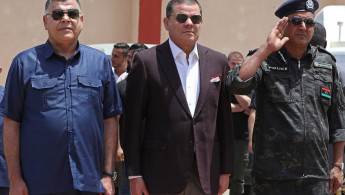Libya disputed PM Abdul Hamid Dbeibah vows to stay put as Bashagha turns up pressure
Libya's disputed prime minister on Thursday dismissed calls for him to step down from power, two days after his main political rival renewed demands for him to do so.
"We will not allow those who try to tamper with the security of the capital and harm civilians, we will look out for them," Abdul Hamid Dbeibah, who came to power as interim premier as part of a UN-brokered peace process last year told the Council of Ministers.
"What exists is a political dispute that will only be resolved through elections," he said.
A long-running political crisis in Libya deepened in February when the eastern-based parliament picked former interior minister Fathi Bashagha to replace the government of Dbeibah.
Dbeibah has on numerous occasions refused to hand over power until elections are held.
Elections were meant to be held last December, but fell through amid disagreements over rules and regulations, among other issues.
Bashagha on Tuesday called on Dbeibah to step down as prime minister, and last week threatened to use force to enter Tripoli.
Troops loyal to Dbeibah were deployed south of the Libyan capital on Thursday evening in anticipation of a potential attack by forces linked with Bashagha, Arabi 21 reported.
The United Nations said Thursday that it was watching events in Libya warily.
'We’re watching with concern the developments in Libya, including the mobilisation of forces, the threats of resorting to force for political aims," Stephane Dujarric, spokesman for the UN Secretary-General said at a press briefing Thursday.
"I think it’s very important that there is a de-escalation on that front and that everyone keeps in mind the needs of the Libyan people, and those needs are political harmony, they’re peace," Dujarric said.
"Nobody wants to see anything go backwards."





 Follow the Middle East's top stories in English at The New Arab on Google News
Follow the Middle East's top stories in English at The New Arab on Google News


